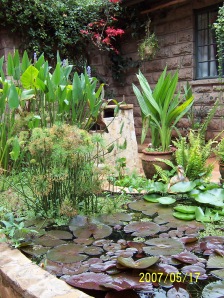It was just about dusk as the plane landed at Jomo Kenyatta International Airport; although a smooth flight from Geneva, I was shattered on arrival, mechanically lining up for Immigration (was my hastily got visa at the Kenyan embassy in Ottawa in order?), waiting for the borrowed red case to appear on the belt and then the final push through customs and into the arrivals area. I hadn’t seen my aunt (or more properly, my ex-aunt, since she and my late uncle had divorced) for over twenty years and wasn’t sure we’d recognize one another, but sure enough, as I rounded the corner there she was just as I remembered, only silver, a quick smile coming to her face. But it was Katherine, former wife and universally known from childhood as Pop, who had contacted me with the news of my uncle’s death, and as I came to know, who would be the one at the centre of arranging the final bits and pieces of his life and passing.
I come from a long line of colonialists on my father’s side, with a grandfather and great-uncle in the Foreign Office in India, Bhutan and Tibet and when my father’s younger brother appeared to be at loose ends for something to do with his life, my grandparents hit upon the plan of shipping him to another colony, this time Tanzania. He was good at tennis, having spent endless years batting a ball against the wall, playing his elder brother until the latter refused to lose to him no longer. While setting up a travel business as a means of support, my uncle’s main occupation for many years was tennis champion, first in Dar es Salaam, then later in Nairobi where he was an active member of the Karen Club, named like the Nairobi suburb for colonials, for the Out of Africa author, Karen Blixen.
It was a good life in the ’60’s and ’70’s, at least for the ruling class – a beautiful climate and a comfortable lifestyle for those that came with inherited money or were willing to put a little effort into starting something, whether it be a farm or a business. My uncle met and married his first wife in Dar, Tanganyika (as it was then known) in the early ’60’s, a short-lived marriage that ended amicably a few years later. A subsequent move to Nairobi and installation at the Karen Club led to the second marriage to my former aunt Pop in 1971, this one surviving until the ’80’s. Our family – father, mother and my sister and I – visited them both at Christmas in about 1980, shortly after my great-aunt Florence had come to live with them from England. Aunt Florence was 92 at that point, and virtually blind and deaf, unable to care for herself, but of sufficient funds to have her nephew and his wife do so in Nairobi. Pop told me after the funeral that having the “aged relative” or “AR” as she was affectionately known come to stay was her attempt to connect her former husband to his roots. Being unsentimental sorts, we Toplis’ are no good at that. But the Christmas visit was fantastic for a girl just finished her first university term, both in terms of connecting with family as well as the exotic destination of which we took full advantage while there. There was something in the air in Africa that grabbed me and I knew I must return sometime in the future.
My uncle’s second marriage ended not long before AR’s death in 1983 and my uncle spent many years living in the guest quarters of his friends the Lowes in another Karen home. For many of his final years, his apparent inamorata was a lovely English woman with whom he seemed to mostly spend time during his annual visit for the Wimbledon matches.
The funeral was set for the day after my arrival, and I had been allotted a few moments to speak. It is not my habit to eulogize at funerals, and being uncertain of the customs to expect from former Englishmen in Africa, I prepared with trepidation. The fourteen hours of flight time gave me lots of time to revise and rehearse in my head; by the time I arrived, I knew it would have to do as my brain was fried. The next day, uncharacteristically wet and rainy, but somehow appropriate, we made our way to the small chapel and prepared to see my uncle off. In a fog, I gave my prepared notes, and people were afterwards polite, calling my remarks “refreshingly different”. We then moved on to the burial location in the Garden of Remembrance in Karen. A reception, fittingly was held in the Karen Club, and here was where I finally got to see a small slice of my uncle’s African life, at least in recent years. They were a vanishing breed, mostly, English, some Australians, a few Europeans, my aunt the token Kiwi. Almost entirely white, except for my uncle’s servants and a few others.
Aunt Pop, graciously housing not only me but also the inamorata and her daughter, had entreated us all to stay a few additional days. The daughter had never been to Kenya, so a full, at least Nairobi-based, tour was on. We saw the fine Nairobi zoo, the sad and enchanting David Sheldrick elephant sanctuary and the Nairobi Giraffe Centre. It seemed wrong to combine sight-seeing and a funeral, but combine we did, sharing completely non-intersecting memories of my uncle as we went. Two days later it was time to return and I realized I had once again caught the Africa bug. And while it was time to say “Kwaheri” to my uncle, I know I will return again to Africa in happier times.

